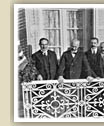
In the subsequent months, until the end of 1909,
the League did not attempt to violate the constitutional order, it merely exerted pressure on the
government and political parties to undertake reforms. Finally, acknowledging its inability,
it selected the well-known Cretan statesman, Eleftherios Venizelos,
as the most eligible person to be entrusted with the role of political
councillor. The choice of Venizelos was dictated by the exceptional reputation he had earned from his
activity in Crete throughout the island's period of independence,
and by his dynamic juxtaposition to Prince
George and the fact that he was a totally new figure, untainted by any
involvement in the Greek political scene.
In the event, Venizelos achieved an honourable withdrawal of the military from power
and reassigned authority to the politicians. He refused to become Prime Minister
himself, but accepted to mediate between the League on the one hand and the parties and the palace on the
other. His advice on convening a National Assembly to revise the non-fundamental articles
of the Constitution was accepted, and in March the Military League dissolved,
renouncing all political claims. In the elections of August 1910, conducted by
the provisional grovernment of Stephanos Dragoumis, which had been appointed in January, Eleftherios
Venizelos was elected deputy, with an impressive number of votes, whereas the independent deputies
identifying with reforms won a considerable victory despite the fact that they were
unknown and running as deputies for the first time. It was as if the Greek people were voting against
the old political world.
|
 |

It is worth mentioning that socialist deputies were also elected, which shows that socialist ideas were alive in Greece.
The thorny question of the time was whether the new Assembly should be
Revisionary or Constituent. Venizelos, after resigning his post in the Cretan Assembly
and the Executive Committee (to enable him to participate in Greek political life),
went to Athens. His arrival met with enthusiasm. Talking to a crowd, he managed to curb
the claim for a Constituent Assembly, and give a Revisionary character to the newly-formed
Assembly. In general, he won consent for a Revisionary
Assembly and loyalty to the king. The king asked him to form a cabinet,
but, foreseeing the difficulties in cooperating with the older statesmen, he persuaded him to proceed to
new elections despite the disagreement of the old political world, who abstained from voting. The election
was won by his newly established party, the Liberal, in November 1910 by an overwhelming majority. The
Second Revisionary Assembly prepared to embark on its policies. The country was entering a new era.
|
 |
